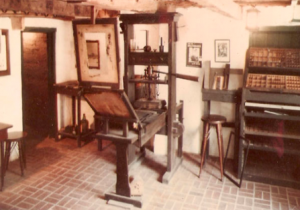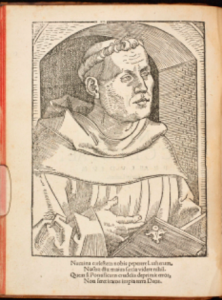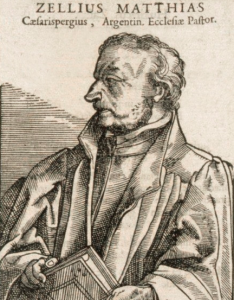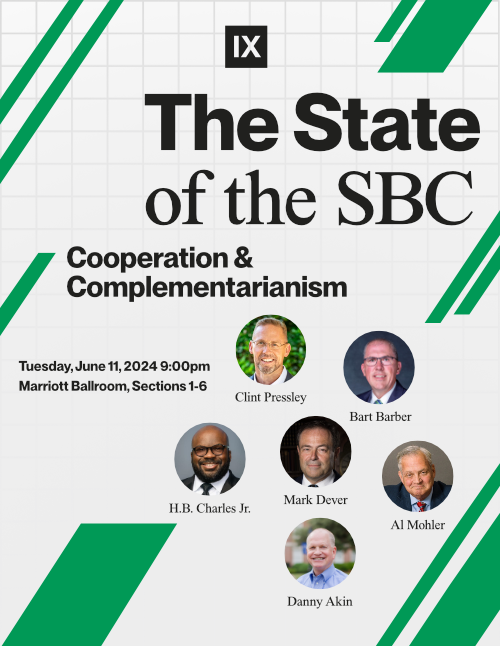This Drives our International Vision
Dear friend,
Several weeks ago I found myself in France’s beautiful Strasbourg Cathedral. Until 1874, this cathedral stood as the tallest building in the world. As our tour guide told the story of this church, he said something that caught my attention: for over 150 years, the church abandoned the Latin Mass and replaced it with the preaching of the Protestant Reformers. What caused this dramatic shift?
In the weeks since, I’ve researched this fascinating history that I wanted to share with you, as we now stand in the shadow of the Reformation’s 500th anniversary.
Spreading Ideas
It was in Strasbourg that the idea of the printing press was born. But after moving to Germany, Johannes Gutenberg refined his idea and developed an operational press. Seven years later, in 1455, 180 Bibles were sold. They each costed three years’ wages. As you know, Gutenberg’s press altered the world as it spread ideas at a previously unmatched pace.
Gutenberg’s printing press
 The 95 Theses that Martin Luther nailed the Wittenberg church door were originally written in Latin, an unintelligible language to most people. But quickly, Luther’s theses were translated into German and widely circulated via Gutenberg’s printing press. Suddenly, the common man was confronted by something other than Roman Catholic orthodoxy. In fact, Luther undermined Roman Catholic tenets by acknowledging the primary authority of Scripture and salvation by grace alone. Luther astutely recognized that the scholastic nature of theological debates would fail to reach the heart and mind of the ordinary man, so he began to write pamphlets with a different audience in mind. From his own pen, Luther wrote in the common tongue and sent his pages to the local printer who then disseminated them across the country.
The 95 Theses that Martin Luther nailed the Wittenberg church door were originally written in Latin, an unintelligible language to most people. But quickly, Luther’s theses were translated into German and widely circulated via Gutenberg’s printing press. Suddenly, the common man was confronted by something other than Roman Catholic orthodoxy. In fact, Luther undermined Roman Catholic tenets by acknowledging the primary authority of Scripture and salvation by grace alone. Luther astutely recognized that the scholastic nature of theological debates would fail to reach the heart and mind of the ordinary man, so he began to write pamphlets with a different audience in mind. From his own pen, Luther wrote in the common tongue and sent his pages to the local printer who then disseminated them across the country.
Printing of Pamphlets

“De captivitate Babylonica Ecclesiae” (Strasbourg, 1520)
These portable, easy-to-read pamphlets played a vital role in the Reformation in Strasbourg. Equivalent to paperbacks, they cost about as much as a chicken, and could be printed quickly en masse. As the Reformers debated their opponents, arguments from both sides were brought into homes, inns, and taverns across Europe.
At Luther’s death in 1546, nearly 3 million copies of his work remained in circulation, and that doesn’t include his Bible translations. A fire had been lit, and no papal edict could halt its progress. During the height of the Reformation, around 10 pamphlets were published for every literate man and woman. Literacy rates, however, were still low, which posed a barrier to the spread of ideas. This enabled the pulpit to become the instrument that bridged the gap between all levels of society.
The Centrality of Gospel Preaching

Matthieu Zell
Though little known today, Matthieu Zell was the first preacher to bring Luther’s ideas to the pulpit in Strasbourg, and the first local writer to publish pamphlets in the city. The people loved him and flocked to hear his sermons. When he outgrew his chapel, authorities padlocked the pulpit of the cathedral. Zell responded by building a portable wooden pulpit in the middle of the cathedral from which he spoke to over 3,000 people. He preached about the love of God and the freedom found in his grace. He poured his energies into preaching the Word of God, allowing Martin Bucer and others to discuss the gospel in the public square.
In Strasbourg, the gospel first spread among the middle class, and the traditional clergy quickly realized there was nothing they could do. The mass was abolished in 1529, the same year Zell was finally allowed to preach in the cathedral pulpit.
Clearly, God used both the pulpit and the printing press in a dramatic overthrow of Catholicism in Strasbourg. Truth arrived to the eyes and ears and hearts of the people, and the Holy Spirit moved in a powerful way.
Continuing the Reformation
Our world is far different than 16th-century Europe, thanks in large part to the Internet and modern travel. But the gospel remains the same. Here at 9Marks, we believe that biblical, expositional preaching and the publishing of practical theology in local languages are two primary means by which societies are transformed. With this in mind, we work to equip and serve indigenous pastors, churches, publishers, and ministries in order to establish gospel “hubs” in strategic cities around the world.
In addition to our stateside ministry, we work with international partners—many of you!—to organize training events, and to translate and publish resources around the globe. In 2017 alone, we organized or attended 13 events; we translated 47 books and 23 journals. Most of these resources can be purchased or downloaded on the Translations Page of our website.
We’ve been encouraged by this past year, and we look forward to the fruit the Lord will bring in 2018. It’s our privilege to know you and to work with you as laborers in the vineyard of our King. Just as the faithful work of the Reformers changed the history of Strasbourg and the world, so God will continue to use Word-centered pulpits and printing presses to proclaim the hope of the cross until Jesus returns. And though change is often slow, the Lord continues, through these ordinary means, to build his church.
Please don’t hesitate to contact me via email at Rick.denham@9marks.org, or to give me a call at 202-848-6322. I’d love the chance to connect with you and learn how 9Marks can better serve you and your church.
In Christ,









